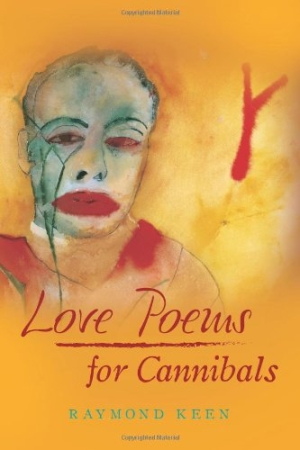Love Poems for Cannibals
Love Poems for Cannibals is filled with beautiful contradictions—humorous at times, yet a deep sense of grieving permeates the collection.
Raymond Keen’s debut book of poetry, Love Poems for Cannibals, is akin to “experiencing a death of ego / with the aid of a little hash.” One part Wilfred Owen and one part Charles Bukowski, Keen’s unique voice is distinct and clear. Often drawing from the aphorisms and iconic language of the Vietnam War, he tells crisp and sometimes difficult stories through the perspectives of a variety of narrators.
Love Poems for Cannibals is filled with beautiful contradictions. While Keen’s poems are humorous at times, a deep sense of grieving permeates the book. Collectively, the poems are filled with a clear-minded portrayal of life and its mundaneness, while detailing human weakness and moments of painful realization. In “Doofus Ensign Comes to Terms With the War,” a young soldier asks a doctor, “What will my mother say / when I tell her I shot a woman?” This is part of Keen’s genius. He records the stories of humans trying to match one reality with another—who they think they are juxtaposed with their actions.
Keen’s poems are often filled with pragmatic truisms, including “man is too evil / to assess his own evil,” and “if man is afraid, / he will protect himself with something frightening.” At one especially brilliant moment, Keen states, “Someone is always dying of cancer, / Someone is always reading the New York Times.” His language is often colloquial, biting, and raw.
Most of the text is logically organized, especially the first half, but the final section deviates in tone and structure from the rest of the volume. In these poems, Keen’s writing drifts from the lyrical and turns towards prose. In general, the book could have been quite a bit shorter; with a culling of the weaker poems, the collection as a whole would be even stronger.
Though there are lulls, the mind is frequently jolted awake by one of Keen’s explosive and cataclysmic images. Many of the pieces demonstrate his ability to write about a quotidian scene with an added element of surrealism. In the poem “Video Confession On Vacation In New York City,” Keen takes an image and turns it on its side: “Sitting in the bathroom, with two / silent angels. Their bluish hands / almost match the faded roses in the / other room. Unforgettable. Lifeless. / Like hair growing underneath your skin.”
While there are many different poetic vignettes in Love Poems for Cannibals, the book revolves around several strong themes, such as the problematic act of expressing ourselves with language and the search for forgiveness and meaning. We see this uprooting, this breaking through into the light, in the poem “We Are The Broken Harps That Sing,” when Keen writes, “Hiding in the language / I was given as a child, / I told mom, I said, / ‘I am trying / to get / a flower / growing.’”
Although Love Poems for Cannibals is Keen’s first book, his poems have been widely published. This beautifully designed volume is filled with the polished work of a seasoned writer. This is apparent in the well-chosen line breaks that snap readers to attention and a cadence that feels smooth and well rehearsed.
Reviewed by
Colby Cedar Smith
Disclosure: This article is not an endorsement, but a review. The publisher of this book provided free copies of the book and paid a small fee to have their book reviewed by a professional reviewer. Foreword Reviews and Clarion Reviews make no guarantee that the publisher will receive a positive review. Foreword Magazine, Inc. is disclosing this in accordance with the Federal Trade Commission’s 16 CFR, Part 255.

